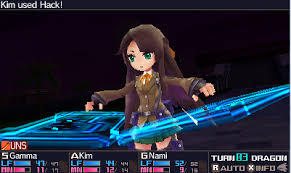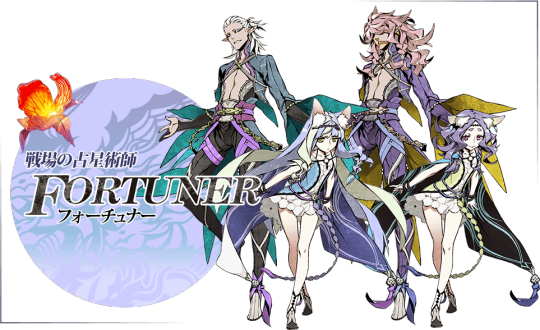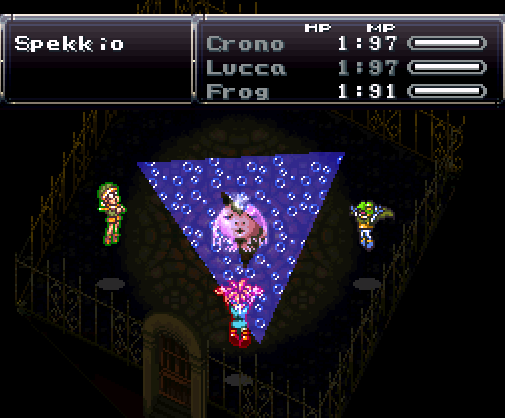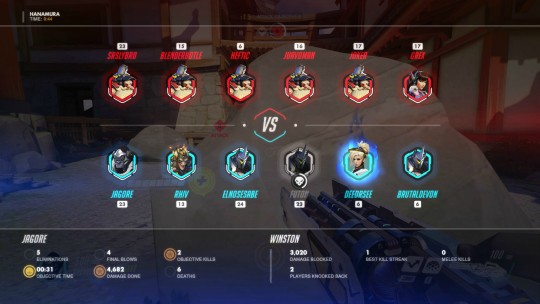Mechanical Dependence in Class Design
When designing classes how the mechanics of each class/character interacts with each other can tell us a lot about how those classes/characters relate to each other.

There is a lot to talk about in 7th Dragon III Code: VFD but I want to focus on two abilities that the Agent class has: "TROY: Fire" & "TROY: Ice". What they do is essentially put a trap on an opponent, once on attacks against them that deals their respective elemental damage will cause it to activate and deal additional fire/ice damage.

Now what is so interesting about these two abilities to me isn't how they function as a way of amplifying a certain elements damage, it is that the class that has these abilities doesn't have any fire or ice abilities. This class doesn't have, on it's own, a way to trigger this effect, only set it up.
Having abilities that set up future attacks isn't so unusual. Almost every game does that. But most games keep everything within a class. If a class has the ability to set something then they will also have the ability to trigger it. For example there is another class in this game called "God Hand" that can add counters to enemies which allow for them to use more powerful attacks against those enemies. There is a buildup and a payoff all within the same class. The Agent doesn't have elemental attacks though, and so can't activate their own setup here. The Agent needs others in order to reach their full potential. This is what I like to call Mechanical Dependence.
The degree to which a class needs others in order to reach their full potential is how mechanically dependent they are, whereas a mechanically independent class is one who doesn’t need any help to reach their full potential. A class that is perfectly mechanically independent would be one that gains absolutely no benefit from anything their teammates might do. A perfectly mechanically dependent class wouldn't able to be able to do anything at all without a teammate.
Given these definitions it is easy to see how every class is going to fall somewhere between these two extremes. Mechanical dependence/independence isn't an on off switch, but rather a spectrum. Classes will all fall somewhere in the middle. This is not a question of if they need teammates but to what degree do they need teammates.

Mechanical dependence/independence can tell us a lot about how classes or characters relates to each other. Chrono Trigger had Duel and Triple Techs that were abilities requires 2 or 3 characters to activate and they would tell you quite a lot about how these characters related to and understood each other. For instance Crono and Frog initially get a long and relate to each other as sword bro's and so they get a duel tech that is them being sword bro's. Magus, on the other hand, is tremendously powerful mage but doesn't get along with anyone and so doesn't have any duel techs with anyone. The few triple techs he is involved with require you to get a special item to be able to use them. The personalities of the characters and their relationships -or lack of a relationship- is reflected in the game's mechanics.

There isn't one right answer to the question of how much mechanically dependent/independent you want classes to be. It is both an aesthetic and a practical choice. World of Warcraft is a great example of a game that keeps everyone relatively mechanically independent for practical reasons. This isn't to say that the game doesn't focus on teamwork, but rather each class’s mechanics serve that class first and foremost and don't need other classes in order to reach maximum damage output.
WoW leans more towards mechanically independent classes for a couple of reasons. First, while in a game like Chrono Trigger you are controlling all the character in the party in WoW you are only controlling the one. This makes modularity -the ability of classes to be easily replaced by other classes of the same role- an important part of their game design philosophy. Each class has to be able to fit well into any team comp, as well as being able to do fine on their own.
Secondly, while I might really like to have complex team comps without clear roles and a lot of mechanical dependence, that complexity makes it basically impossible to automatically form groups of players that will be able to work well together. A large degree of mechanical dependence would require a absurd degree of team co-ordination and would require every player to understand the mechanics of every other class, which is just straight up not going to happen if you stick 5 random people together when none of them have clear roles.

Mechanics can tell stories about your characters. It can tell you a lot about who your characters are and who they are to each other. For example, in 7th Dragon 3 I ship two of my party members together based purely on how well their mechanics work off each other and as such they are always on the same team and looking out for each other. Maybe you have a character who, on their own, isn't very strong but if matched with someone who can help set them up becomes an unstoppable powerhouse. Using and manipulating how mechanically dependent/independent classes are is just another way to make characters feel like the things your story is saying they are.
About the Author(s)
You May Also Like













